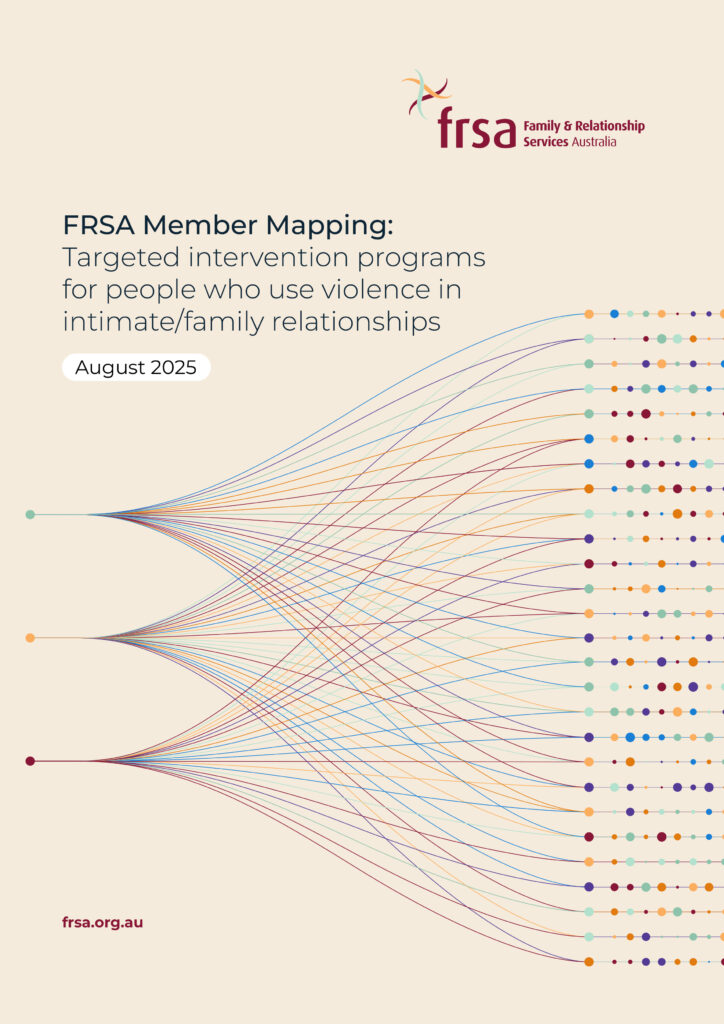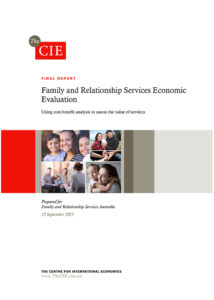Latest FRSA Research
FRSA Member Mapping: Targeted Intervention Programs for people who use violence in intimate/family relationships
August 2025
Almost 6,000 people who use violence engage in FRSA member programs each year. Every contact is a chance to protect families, support children and strengthen communities.
Our Member Mapping report shows that most programs are group based, with some also providing case management or individual support. About 80 percent include vital support for partners and children, but the scope is inconsistent and constrained by funding. Wait times of more than six weeks are common for many services, which risks losing people when they are ready to engage.
FRSA calls for these programs to be recognised as critical entry points for family safety, for wraparound supports to be standard practice, for deliberate links with housing, health, justice and child and family services, and for outcomes to reflect what matters most to communities, safer families and long-term change.
To view other FRSA work, please visit our Corporate Publications, Submissions or Conference e-Journals pages.
Other FRSA Research
Family and Relationship Services Economic Evaluation: Using cost-benefit analysis to assess the value of services
September 2023
Family and relationship services provide a range of psychological, emotional and physical benefits to Australians in need, with this review demonstrating a substantial return on investment.
FRSA commissioned the Centre for International Economics (CIE) to undertake this Cost Benefit Analysis of family and relationship services to quantify the value that these services provide to clients, and the wider community. This includes Family Law Services delivered by not-for-profit providers and funded by the Attorney-General’s Department as a sub-program under the Family Relationships Services Program, and in-scope services (sub-activities) under the Families and Children Activity, funded by the Department of Social Services.
This report builds on the already substantial body of evidence that supports the link between the provision of the suite of family and relationship services and improved health, safety, family functioning and development, social and community connectedness, and financial and economic benefits.
The use of Telepractice in Family and Relationship Services: A Focus Group Exploration
May 2022
This report presents the outcomes of focus group discussions held with FRSA members to explore experiences and perspectives on the use of telepractice in the family and relationship services sector.
It builds on the survey report, Family and relationship service providers’ experience of telepractice during COVID-19, released in November 2021. FRSA felt it was important to further explore the benefits and disadvantages, of telepractice across each program type to inform telepractice developments in the sector.
The purpose of this second phase of exploring telepractice use by family and relationship services was to gain a more nuanced understanding of the suitability and practice implications of telepractice as a service delivery method post COVID-19 and into the future. We sought to respond to the question: In what circumstances is telepractice a safe and suitable mode of service delivery in the family and relationship services sector?
Service Demand: Family and relationship services - Issues Paper
Survey: Impacts of the COVID-19 pandemic on service demand for family and relationships services
December 2021
This work stemmed from a member discussion in June 2020, which looked at how a robust picture of demand (including unmet demand) could be captured by the sector. The discussion took place against the backdrop of the COVID-19 pandemic, and on the tail of devastating bushfires and floods.
Anecdotally, FRSA members reported increases in demand for some family and relationship services, and anticipated increases in demand for others – particularly as the longer-term effects of isolation, unemployment and financial uncertainty from the pandemic played out.
What became clear through the member discussion, however, was that there was no simple way to pull together data on service demand trends from across the sector to inform the Government’s response to the pandemic crisis. Members outlined several challenges to collecting data in a consistent way across programs and across providers.
It was agreed that FRSA would establish an advisory group to explore how to better identify and track service demand and need data. The Advisory Committee agreed that two pieces of work should be undertaken:
- Develop an issues paper that further explores the barriers to collecting accurate service demand data
- An exploratory survey with members to gain insights on the early impacts of COVID-19 on service demand.
The survey report shows that the first six months of the COVID pandemic impacted service demand levels across the sector in diverse ways. The complex service demand picture presented by respondents revealed the multiple factors at play in influencing service demand patterns – for example contextual factors like policy settings and different supply-side and demand-side factors.
The survey report brought to life the considerations and challenges to effectively capturing service demand discussed in the issues paper. Notwithstanding these challenges, FRSA believes that it is important our sector works with government to do more to understand the demand picture as the effects of the pandemic and other health, social, environmental and economic challenges unfold over time.

Family and relationship service providers’ experience of telepractice during COVID-19
November 2021
This project was commissioned by Family and Relationship Services Australia (FRSA) and undertaken by the Australian Institute of Family Studies (AIFS). It was conceptualised in response to the necessary and rapid increase in use of telepractice due to COVID-19 in family and relationship services in Australia.
FRSA wanted to capture the experience of service providers and through them, the children, men, women and communities they worked with during this time. AIFS conducted the research drawing from the experience of FRSA members.
Prior to undertaking this research, AIFS conducted a literature review to respond to the following research question: What evidence is there on the use of telepractice in family and relationship services? This report – The use of telepractice in the family and relationship services sector – is available on the AIFS website.
Expiry of the Social and Community Services Pay Equity Special Account: Implications for family and relationship services Report
March 2020
The Centre for International Economics was commissioned by FRSA to consider the impact of possible reduced funding levels to the FRSA membership base from 1 July 2021 due to the expiry of the Social and Community Services (SACS) Special Account.
Summary of key points
March 2020
Key points from the Centre for International Economics’ report: Expiry of the Social and Community Services Pay Equity Special Account – Implications for the family and relationship services sector commissioned by FRSA.
An audit of intake screening and assessment tools used in the family and relationship services sector
November 2019
This summary report shares the results and case studies from the FRSA members survey titled: An audit of intake screening and assessment tools used in the family and relationship services sector. The summary report is a significant step in the direction to enacting recommendations made in the FRSA research report: Strengthening prevention and early intervention for families into the future (2017).
Strengthening prevention and early intervention services for families into the future (2017)
March 2017
FRSA is proud to launch the research report Strengthening prevention and early intervention services for families into the future, commissioned to Professor John Toumbourou and colleagues at the Centre for Social and Early Emotional Development (SEED) in the School of Psychology, Deakin University.
The report investigates the current and future potential for our sector to take a greater prevention and early intervention approach in our service delivery to ameliorate multiple risk factors and enhance multiple protective factors—toward improving the wellbeing of the children, families and communities we serve.
Value For Everyone Report: Understanding the Social and Economic Benefits of Family Support Services (2013)
October 2013
This report was produced for use when advocating for increased investment in high quality support services for families. It summarises current evidence – Australian and international – demonstrating that investing in early intervention for families results not only in a socially just, inclusive society but in a productive economy as well.
Community Engagement in Post Separation Services: An Exploratory Study (2012)
July 2012
The purpose of this project was to explore community engagement activities undertaken in the post‑separation services funded by the Attorney‑General’s Department, through the Federal Government’s Family Support Program (FSP).Through this research FRSA sought to understand how community engagement should be defined and understood in the context of post‑separation services. Post‑separation service providers were invited to identify the purposes and benefits of engaging with the broader community and sought to identify factors that drive and restrain community engagement, both internal and external to the organisation. A clear and consistent message was that community engagement requires long term commitment, the development of relationships of trust and respect, and the utilisation of community strengths and skills. Hard copies can be provided on request.
Workforce Development Strategy (2012 – 2017)
This strategy is the culmination of work that began in 2008 when FRSA convened a joint sector-Government working group on Workforce Development with representatives from FRSA member organisations, the Australian Government Department of Families, Housing, Community Services & Indigenous Affairs (FaHCSIA), the Attorney-General’s Department and the Community Services Health & Industry Skills Council (CSHISC). The purpose of the strategy is to secure and develop the capacity of the family and relationship services workforce to meet the needs of Australian families now and into the future.
Linkages & Collaboration Project (2010)
October 2010
The Linkages & Collaboration: What Helps, What Hinders Project explored service linkages and collaboration between Family and Relationship Services (FRS) and related community service sectors such as health, mental health, child welfare, family law and community or neighbourhood networks. The project, supported by the Australian Government, specifically focused on five communities from around the country. The report highlights a number of recommendations and future directions for community service organisations on how to improve their services to families, children and young people through collaboration.














